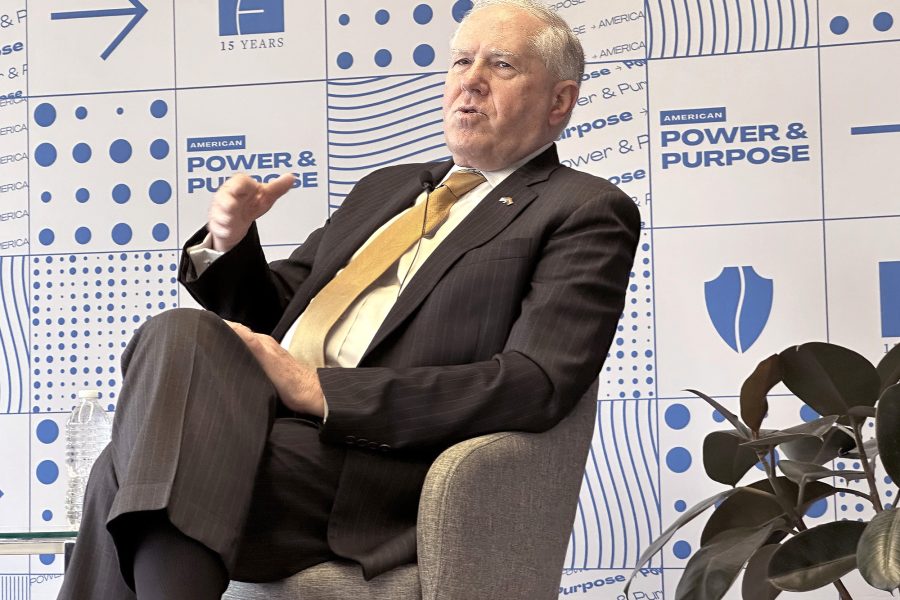The Air Force does not have serious long-term concerns about recruiting, Secretary of the Air Force Frank Kendall said June 22.
“We have things that we can do to manage our way through this, so we’re not in any kind of crisis,” Kendall said at an event hosted by the Center for a New American Security. The Air Force is in line to miss its recruiting goal by about 10 percent this year for the Active-Duty Force, with slightly worse numbers for the Guard and Reserve.
Kendall said the service has tried to offer more flexibility in a competitive job market to help bridge the shortfall.
Led by Gen. David W. Allvin, the service’s Vice Chief of Staff and expected successor to Chief of Staff Gen. Charles Q. Brown Jr., the Air Force has looked to make policy changes that make the service a possibility for those who may have previously been excluded.
Kendall said Allvin has led a team to “kind of push through some of the bureaucracy that makes policy changes slow.” The target of one of Brown’s four signature ‘Action Orders,’ bureaucracy is an oft-cited bogeyman for the service’s woes as it is trying to rapidly modernize to meet the challenge posed by China’s growing military might.
“We’ve got a long list of things that where we have rules in place that really didn’t make any sense,” Kendall said. “We’re not lowering our standards.”
But the service is loosening its tattoo rules, changing how it measures body mass index, and offering a second chance for some prospective Airmen who test positive for marijuana. Individually, Kendall said, the policies are not revolutionary. Together, though, they are part of a broader effort to appeal to more Americans.
“We’re doing some things on the margins and we’re seeing very specific increases coming out because of that,” Kendall said.
Kendall said those lessons could be applied more wholesale across the service to offer more flexibility.
“The situation we have right now is probably going to give us an opportunity to, I think, take a look at a number of policies and adjust them where we can be more open to terms of people we weren’t letting in before,” Kendall said. While the Space Force doesn’t have recruiting issues, Kendall said, the young service allows for more innovative thinking, such as directly commissioning officers from industry to attach high-level talent.
In addition to the challenges the Department of the Air Force faces from the labor market, military personnel issues have become increasingly politicized as of late. Kendall said one of his biggest concerns is misperceptions of the military—misperceptions that are often reinforced during contentious hearings on Capitol Hill.
“There are, both on the left and on the right, there are some criticisms and some issues that get brought up, and I think overemphasized,” Kendall said.
Two main issues can be misconstrued, Kendall said: the military is not concerned with preventing sexual assault and the Air Force’s efforts to be diverse and more welcoming to people with a myriad of backgrounds are undermining its core mission as a fighting force.
“The positive story there is that we’re working very hard to address sexual assault, sexual harassment,” Kendall said. “On the diversity side, the military is essentially a conservative organization. It has always been, and I think always will be. But it’s a diverse force, and it’s getting more so over time, and you want it to be as effective and capable as it can be. That means that people are going to have to work with people that they haven’t had a chance to be exposed to or understand in the past, have some empathy for them, understand what they’ve been through in their lives, and be able to make them as effective as they can be and be able to work with them well on a team.”
Kendall framed his views on personnel through the lens of his trademark focus: China and the possibility of a near-peer conflict.
“All the things we’re doing in making it a safer place to work and to make it a place where teams everybody on the team is respected and is working to their full potential is all about our ability to do our job at the end of the day,” Kendall said. “We may be back in a combat situation sometime where we have a lot of casualties. We will have to do other people’s jobs. We have to keep working under extreme stress. So that’s what we’re shooting for. All the other things that we talked about contribute to that. They give people the freedom to focus on their work.”
